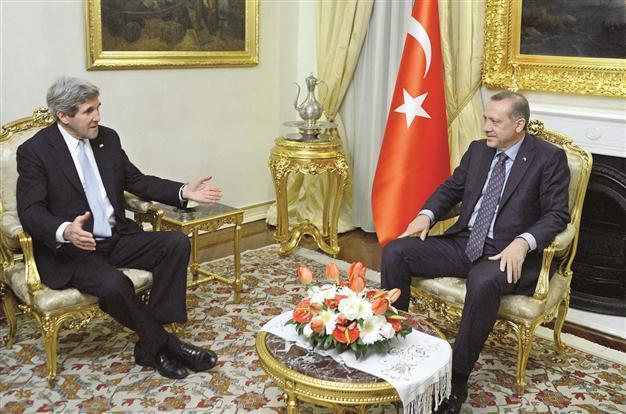US, Turkey divided on Israel after PM Erdoğan's Zionism remarks
ANKARA

Turkish Prime Minister Erdoğan (R) meets top US diplomat Kerry in Ankara. AA photo
Newly appointed U.S. Secretary of State John Kerry’s talks in Ankara could have displayed a rosy picture, since it was his first rendezvous with the Turkish leadership in his current capacity, yet Washington’s strong uneasiness over Prime Minister Recep Tayyip Erdoğan’s likening Zionism to crimes against humanity dominated the talks.
While publicly labeling the remarks by Erdoğan as “objectionable,” Kerry also delivered a carefully tailored warning to his country’s NATO ally over significance of freedom of expression for reaching to democratic standards.
“We not only disagree with it, we found it objectionable,” Kerry said on March 1 at a joint press conference following talks with his counterpart, Foreign Minister Ahmet Davutoğlu, as he noted that he had raised the issue directly with Davutoğlu and would do so with Erdoğan during his meeting, which was scheduled to take place shortly after the press conference.
Kerry’s remarks on the issue were delivered in response to a question that also offered an opportunity to him to underline the importance Washington attaches to restoring bilateral relations between Turkey and Israel, which he described as two “vital allies” for the United States. Earlier, in his opening remarks before the questions by reporters, he underlined “the urgent need to promote the spirit of tolerance” and said this urgency was also valid for public statements by political leaders.
As of Feb. 27, at a U.N. Alliance of Civilizations meeting in Vienna, Erdoğan said: “Just as with Zionism, anti-Semitism and fascism, it has become necessary to view Islamophobia as a crime against humanity.”
“It [Erdoğan’s] underscores the importance of our efforts to try to find a way to make peace in this region,” Kerry said, while cautioning that the comments by Erdoğan on Zionism complicate Mideast peace efforts.
Expressing conviction in finding a way forward for restoring the relationship between the two countries, Kerry, however, admitted that this way “obviously gets complicated” following the Vienna speech.
“We want to see them work together in order to be able to go beyond. I believe that’s possible. It is essential that Turkey and Israel find a way to take a step in order to rekindle their historic cooperation,” Kerry said, while noting that Davutoğlu also expressed a “genuine desire” for rebuilding ties with Israel. During their meeting, Davutoğlu voiced Turkey’s commitment to the Middle East peace process and a two-state solution, Kerry said. “They want to help us.”
Another bothersome issue Kerry touched upon without waiting for a specific question from reporters was the state of affairs surrounding the freedom of expression in Turkey.
“We discussed the importance of strengthening protection of fundamental rights, freedom of expression and freedom of media. History has proved that nations that worked constantly to safeguard these rights democracy are far more successful, far more stable and far more prosperous,” Kerry said.
For his part, Davutoğlu strictly rejected that Turkey has been acting “hostile” toward Israel, when a U.S.-based reporter particularly used this expression in his question.
Turkey has been against anti-Semitism along its history and will continue this stance regardless of its bilateral relations with Israel who hasn’t used the chance given to them for restoring of ties, Davutoğlu said, in an apparent reference to Turkey’s conditions of normalization.
“Turkey is always ready to do whatever it needs for a fair two-state solution based on 1967 borders,” he, however, added, as his U.S. counterpart already said that one of the reasons taking him to Ankara was revival of Middle East peace process and seeking Turkey’s help.
Both Kerry and Davutoğlu chose not to highlight differences of their countries regarding the Syrian crisis, as they both underlined their common conviction on priority of a political transition in the war-torn country. Although Ankara’s cooperation with Iraqi Kurdistan Regional Government (KRG) despite Baghdad’s objection is a source of uneasiness, the issue didn’t come up at the press conference.
